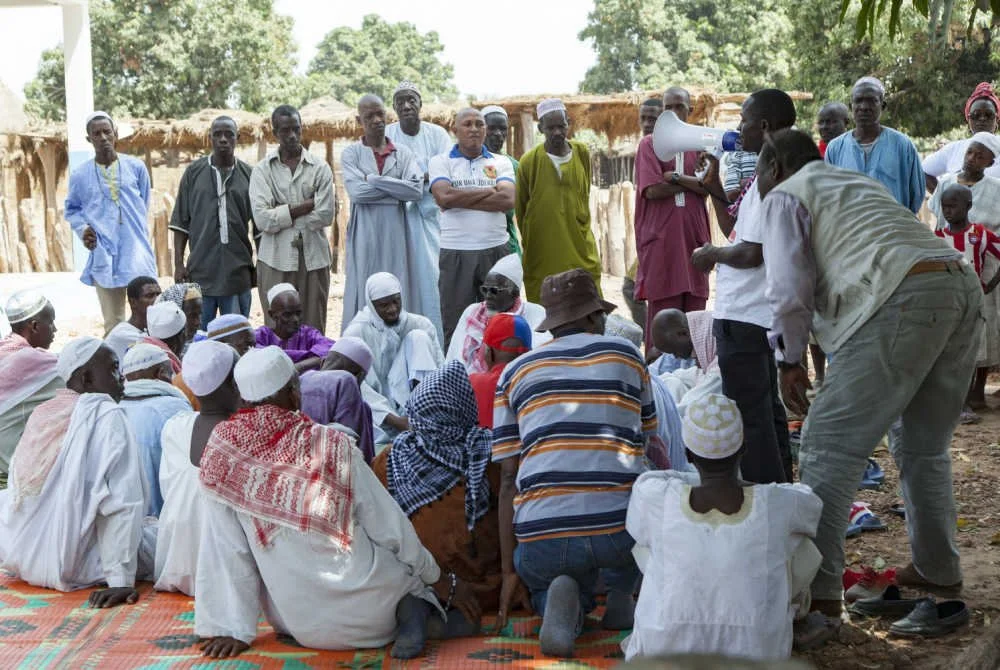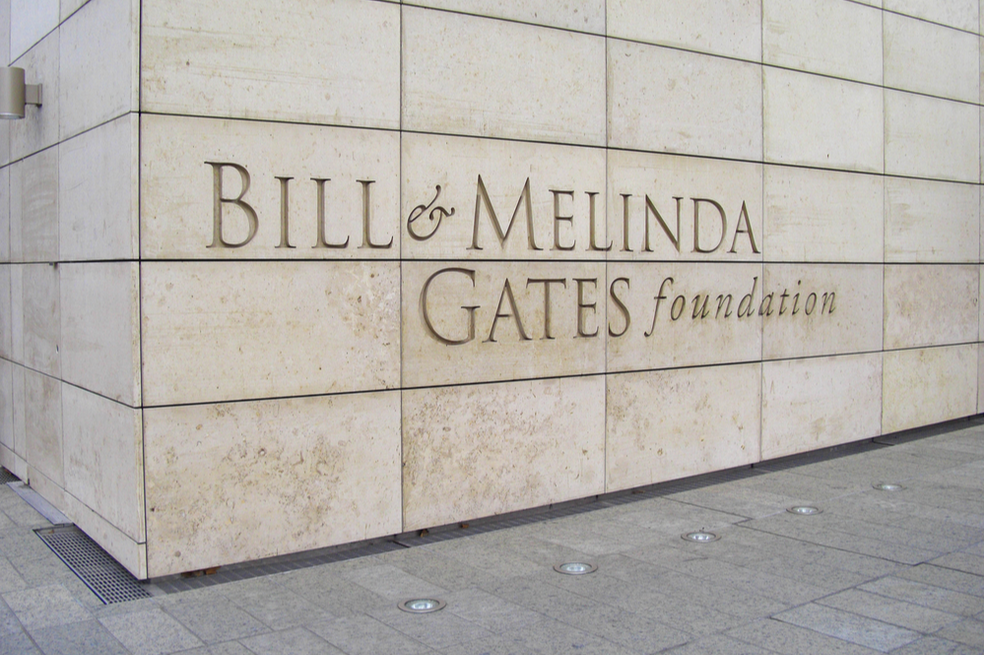Beyond Band-Aids: For a Funder Collaborative Taking on Global Poverty, It's All About Changing Systems
/A health worker in liberia. Photo credit: UNMEER
Buzzwords sprout like weeds in both philanthropy and international development, and the latest specimens are “big bets,” “systems change,” and “collaborative philanthropy.” Co-Impact, a philanthropic venture created in 2017 by Olivia Leland, the founding director of the Giving Pledge, uses two of the three in its lofty mission statement, saying it is a “global collaborative for systems change, focused on improving the lives of millions of people around the world.”
Co-Impact’s core partners include Richard Chandler, Bill and Melinda Gates, Jeff Skoll, the Rockefeller Foundation, and Rohini and Nandan Nilekani, as well as other co-investors and community members. In January 2019, it announced its first round of grants, which total $80 million and support five initiatives that aim to improve education, health, and economic outcomes for 9 million people across Africa, South Asia and Latin America.
Co-Impact, which plans to make hundreds of millions of dollars in grants in the next few years, is just the latest funder-backed venture looking to attack tough problems at a deeper, structural level. But what does systems change really mean in philanthropy and what does it mean for Co-Impact? What is its methodology for achieving it? To answer these questions, I spoke with Co-Impact Vice President for Programs Rakesh Rajani.
Two Models of Systems Change
Rajani thinks that the idea of systems change in philanthropy and development is now pervasive primarily because “people are thirsty to get to the root of the problems.” Donors want to get “beyond the Band-Aids and find ways for the overall system to work better.”
If addressing root causes is the meaning, is that really new? After all, even the grandfathers of American philanthropy—Andrew Carnegie and John D. Rockefeller—embraced the idea of “scientific philanthropy,” which aimed to address root causes of social problems, as opposed to charity, which merely ameliorated symptoms.
But the focus on root causes is just one element of the new systems change discourse. Systems change and its corollary—systems thinking—have burgeoned into a veritable industry, and several consulting firms and advisors are building tools to assist anyone who aspires to it. A Google search on systems change returns 2.5 billion entries. In the official development assistance (ODA) world, since 2014, implementers associated with the United Kingdom’s Department for International Development (DFID) have advocated complex systems thinking to address the world’s “wicked problems.” In 2016, Rockefeller Philanthropy Advisors (RPA) launched its Scaling Solutions Toward Shifting Systems project. The March 2019 issue of Alliance magazine focused on systems change philanthropy. But although it seems everyone now wants to change systems, the reality is, as this 2018 blog post by RPA concluded, “The philanthropic sector does not have a consensus around the term ‘systems change.’”
That said, two distinct models of systems change seem most relevant to global development donors: one that emphasizes “big bets,” and another calling for a diverse set of smaller bets—that is, more of a portfolio or ecosystem approach.
Both models begin with the premise that social problems are rooted in complex systems with dynamic, interconnected layers and causes. Systems thinking derives from complexity theory in mathematics and natural science, but the application to social and global development problems was influenced by the 2008 publication of Thinking in Systems, written by the environmental scientist Donella Meadows.
But after conceding the complexity of social problems, the two models diverge. The big-bets model supports awarding large, unrestricted grants to organizations led by visionary social entrepreneurs that can scale proven solutions. The Bridgespan Group popularized the idea of big bets in philanthropy in this 2016 article in Stanford Social Innovation Review (SSIR), where the authors called for longer-term, unrestricted, and flexible grants of at least $10 million to promising social change initiatives. They argued that by radically transforming a grantee’s ambitions and capabilities, these types of grants have fueled some of the most successful social change initiatives in the 20th century, such as the Green Revolution, the rejuvenation of conservatism in the 1970s, and the movement for lesbian, gay, bisexual and transgender (LGBT) rights.
A follow-up report released in Spring 2019—which includes contributions from authors outside of Bridgespan—further explains how and why big bet grants produce impact. “Small gifts lead to small thinking,” said the directors of the One Acre Fund, an NGO that supports smallholder farmers in Africa. Its receipt of a big bet grant facilitated its growth from four to six countries, turning a tree-planting trial from an experiment to a full-fledged program, and the building of a new Kenyan headquarters. In other words, big bets are a form of growth capital for social entrepreneurs.
Another contributor argues that what is game-changing about big bets is the unrestricted nature of the grant. By providing flexible funding that can go toward general operating support, funders allow grantees greater decision-making authority and flexibility for real-time adaptation. In this formulation, it is not the size that matters most, but instead the funding mechanism, which signals trust and respect, and empowers grantees to make adaptive decisions.
The portfolio or ecosystem model adopts a diametrically opposed strategy of tackling systems change. Yes—social problems are complex, with multiple causes, layers and interaction effects. But that is precisely why donors should place many small bets, targeting multiple entry points to a problem and learning what works in real time. The portfolio model has been most clearly articulated by researchers in the ODA world, such as in this report by researchers at the Overseas Development Institute. On the philanthropy side, the FSG group has developed a version which also highlights the need to transform power relations between donors and grantees if genuine systems change is to take place.
It is worth thinking through the relationship between these two models. The portfolio model suggests that when tackling systems change, donors should start by providing a form of “risk” or “angel” capital to fund multiple intervention types addressing different parts of the ecosystem, and then only scale up based on evidence. The big-bets model emphasizes growth capital to scale and grow organizations with proven solutions quickly. One possible view of the relationship is that donors should initially use the portfolio model, and once proven solutions are identified, shift to the big-bet model so that these solutions can be implemented at scale.
By the time Leland introduced Co-Impact in 2017, a few private funder collaboratives pursuing transformational “systems change” already existed, addressing both domestic and global problems. For example, Blue Meridian Partners, created in 2015, pools together philanthropic resources capital to make big bets on solutions to U.S. poverty. On the global side, The Freedom Fund, created in 2013, aggregates private capital to “tackle the systems” that allow modern slavery to persist.
Co-Impact’s Theory of Systems Change
Co-Impact is the first big funder collaborative focused on global development, broadly defined. Its model includes three categories of philanthropists: (1) the core partners, who commit $25 to $50 million over 10 years; (2) co-investors who commit a minimum of $5 million over five years; and (3) the community of up to 100 individuals, families or foundations that commit $250,000 to $750,000 per year over three years. This model provides an on-ramp for the swelling ranks of the billionaire class who hope to support global development initiatives but need to learn about the field.
By pooling resources to make grants of up to $50 million in unrestricted funding over five years, Co-Impact’s approach to systems change fits into the big-bets model, but with a critical twist that stresses investing in game-changing organizations that are working in networks with multiple stakeholders.
While Co-Impact is still refining its methodology for identifying specific initiatives to support, an internal document states, “We believe that systems change is most likely to succeed when a strategic adaptive organization develops a winning coalition to advance a transformative initiative, which targets a specific key fulcrum or leverage point in the system.”
This means that the transformative idea or initiative, which must have been shown to work in “multiple real world contexts,” should be both “meaningful in itself” and one that can “serve as a fulcrum for inspiring broader transformation” in the system. For example, in education, basic literacy skills help children read, but they also help children achieve the foundational skills and confidence for lifelong learning and success.
Co-Impact’s emphasis on a “winning coalition” is an important evolution of the big-bets model. It reflects a belief that real systems change requires “collaboration among a range of organizations, people, and institutions,” especially government, which plays “the most crucial role” in ensuring the sustainability of the change.
As part of this focus, Rajani emphasizes that Co-Impact intervenes “at scale” rather than conducting pilot experiments and then scaling up. “The world is full of technical solutions that have been shown to work in pilots but are often not adopted by leaders because of political and institutional barriers,” he said. Instead, Co-Impact “inverts the relationship”—putting big money behind ideas ready to work at scale.
Systems Change in Practice
To better understand its approach, Rajani walked me through one of Co-Impact’s first-round grants, one awarded to the Global Fund to Fight AIDS, Tuberculosis, and Malaria and the Liberian NGO Last Mile Health to support Liberia’s National Community Health Assistant Program. Former President Ellen Johnson Sirleaf launched the program in 2016 in the wake of the country’s Ebola crisis. The program is scaling a community health workforce of 4,000 to provide 1.2 million rural Liberians with access to primary healthcare.
“You could make a list of 50 things needed in the Liberian health system, but the heart of any effective health system is community health workers,” Rajani said. About 60 percent of rural Liberians live more than five kilometers—or a one-hour walk—from the nearest health clinic, effectively preventing them from accessing basic health services. Community health workers (CHWs) are community health aides who are selected and trained within their own communities, where they work. Although they do not possess formal tertiary education, the theory is that after training, they can provide primary health services, especially in maternal and children’s health, and can bridge the gap between remote, rural areas and the formal healthcare system. The idea has a long history, dating back to the Chinese “barefoot doctors” of the 1950s, and was promoted in the 1978 Alma Ata Declaration on Primary Health Care.
The Liberian program recruits, trains, equips and pays the workers $70 a month. The training consists of about 240 hours covering four subjects: infectious disease prevention and surveillance; reproductive, maternal, and neonatal health; child health; and adult health. The compensation is a critical component because one of the reasons the CHW programs of the past failed is because they expected people to work for free. In 2018, the World Health Organization (WHO) issued new guidelines on CHWs, which “strongly” recommended that they be compensated based on hours worked, rather than performance-based incentives.
What About the Neoliberal Capitalist System?
Co-Impact’s model of systems change sees a central role for government, and is a welcome change from service-delivery programs that privilege NGOs, or worse, market-based solutions that require the poorest members of society to pay. It is absolutely essential that donors move beyond a neoliberal skepticism of government’s role and place the building of government capacity at the front and center of the global development agenda.
But eventually, Co-Impact’s approach in low-income countries will hit constraints that derive from other systemic issues. For example, in order for the Liberian health program to be sustainable, the government must raise revenues outside of foreign aid—a goal that is described as “domestic resource mobilization.” But the Liberian government has trouble increasing revenues partly because of the constraints of the global capitalist system. The current rules of the international trade system prevent the government from using subsidies to protect and build domestic industries. The international financial system permits multinational extractive and agricultural companies to engage in legal tax avoidance, as well as illegal tax evasion, depriving the government of revenue—a challenge for all low-income countries that the OECD's 2018 Development Cooperation Report highlighted.
What’s the role of private philanthropy in challenging and transforming the global capitalist system? That is a complicated question, but one that must be asked and debated. While philanthropy has long played a role in international affairs, what’s changed is the scale of its involvement—reflecting the exponential rate of private wealth accumulation over the past four decades. Private donors are now significant actors in global development, especially in the global health and reproductive health sectors, where they are now the third-largest source of funding, according to the OECD report.
As philanthropists increasingly aspire to “systems change” in global development, and bring tremendous financial resources to the table, their role—and relationship to government donors—must be guided by some sort of normative theory. Any serious investigation of these questions will benefit from the engagement of political philosophers, who, since the publication of John Rawls’ A Theory of Justice, have wrestled with the dilemmas of global distributive justice.







































